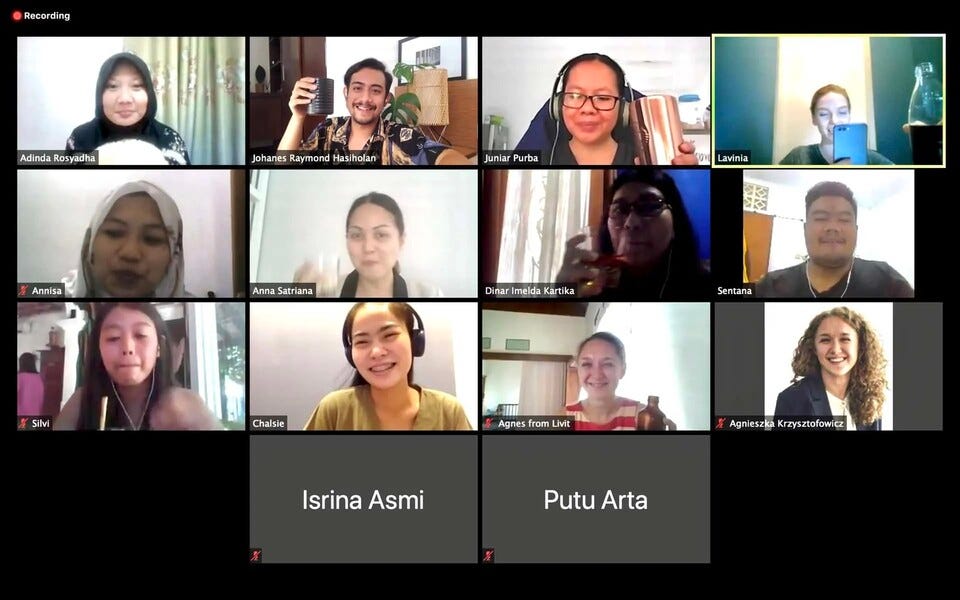What's one thing you wish you knew before becoming a remote leader?
Earlier this year, I shared my answer to this question with an audience of 400 people, from a beautiful stage in Lisbon.
This is, more or less, what I said 👇
I’ve worked remotely for as long as I can remember,
in some shape or another.
As early as 15 years ago, when I ran projects in AIESEC, a student-run NGO, we routinely worked with team members and stakeholders from different regions, countries and cultures. I would crouch by the wall in my little dorm room and bang away at my keyboard until the wee hours, my roommate occasionally sighing with annoyance in her sleep.
I’d never known a different reality, but one where working, connecting and collaborating with other humans online, humans I’d never met and might never meet face-to-face, was a logical, given part of life - though, of course, not my whole life.
So…
The one thing I wish I knew before becoming a remote leader is that, for most people, adapting to intentional, high-performance remote work is a profound transition, and shouldn’t be underestimated. It’s like parachuting yourself from the deep countryside into one of the world’s mega-cities and being expected to know by heart the subway lines, navigate your way through intricate one-way streets, understand different social norms and use three types of software to admin your bills, neighbourhood planning and civic involvement right away. All with no issues whatsoever.
It wasn’t obvious to me that this transition requires the willingness and determination to learn a whole new "operating system”.
These two ways of working involve different principles, tools, mindsets and, essentially, different ways of operating. And our teammate, let’s call him Bob, who’s never functioned in that sort of environment before, would need training and a well-managed transition to do so.
It wasn’t obvious to me that people who could always walk up to their colleagues at work and tap them on the shoulder to get what they want right away, would need to be taught the basics of focused work and asynchronous communication.
Bob interrupting his colleagues any time he needs something, and expecting an answer asap, is great for speed and collaboration but not great for deep work - which is the pinnacle of knowledge work. A designer or a coder adds the most value by doing what she/he knows best - focused work, not by sitting in endless meetings. Smart teams need to find a balance between both of those.
As Luca Sartoni would put it, Bob’s team doesn’t need more communication, they need better documentation. Which segways us into...
It wasn’t obvious to me that someone who has never documented a process, decision or proposal in clear, concise writing, would struggle to do so right away.
The lack of documentation for important matters like this means that Bob’s team:
would have no choice but to encourage Bob interrupt his colleagues Tyas and Shane every 5 minutes to ask questions
risk losing all of that knowledge to fickle human memory
risk that knowledge leaving the company together with Tyas who ‘owns’ and remembers it.
But Tyas is expensive for the company, and science says every time she gets interrupted, it takes her up to 25 min to get back to switch context and attain the level of focus she had before the interruption. Is that an intelligent use of resources?
I could go on for a while, but you get the point.
Superpower to necessity
I also wish I knew how remote work would, in the early 2020s, quickly transform from a superpower, a niche skill acquired by the fans of Basecamp, Time Doctor and Tim Ferris, into a necessity.
It now makes the difference between those "remote-privileged", who can work from anywhere, access opportunities from all across the world, make-dollars-and-spend-rupiah, enjoy their coconut lattes, morning surf and tropical smoothie bowls in Bali or Thailand; and the rest, the “others", who have to depend on low-paid, highly-seasonal jobs within 5 square kilometres around where they happened to be born.
Remote work is the best equalizer the world has seen in a long time. But it can also be a separator, a tough wall to climb.
That's why in 2020, I started the Remote Skills Academy, where we have so far equipped over 5000 young Indonesians with digital and remote work skills.
Skills like the basics of organizing yourself in a virtual office or headquarters, virtual assistance, project management, digital marketing, social media & community management, AI-powered marketing & more. Skills that allow our students to get paid 2-10x their previous salaries while often working 50% of the hours and no longer needing to commute.
We’ve since run programs for Thai, Philippino and Hungarian students, too.
So remote work can be a part of the only normal our students will ever know, from the get-go, like it was for me.
I look forward to seeing this happen in many other places across the world.
The future is already here.
It's just not evenly distributed.
Shall we make it so?




Great article, and thanks for the shout out!